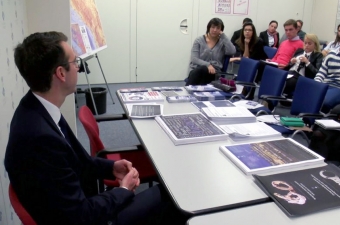In cooperation with the Youth Initiative for Human Rights (YIHR) from Serbia, the Outreach Programme organised a two-day study visit to the Tribunal for 25 young people from Serbia, Kosovo, France and Germany. The focus of the visit was the Tribunal’s work, achievements and jurisprudence, as well as work of the Mechanism for International Criminal Tribunals (MICT). The participants met with an ICTY Judge and staff members from the Tribunal’s and MICT’s Office of the Prosecutor and the Registry. In addition, they attended a presentation on the role of the media in war crimes trials, given by the Director of the independent news agency Sense, based in The Hague. Also, the participants attended hearings in the Mladić case.
The highlight of the visit was a questions and answers session with ICTY Judge Alphons Orie who talked to the visitors about the role of the judge in court proceedings. OTP’s Research Officer, William Tomljanovich took the audience through the history of the conflicts in the former Yugoslavia and explained the ICTY’s structure and jurisprudence. He also elaborated on the separate organs of the Tribunal and their respective roles and responsibilities. A representative from the ICTY’s Victims and Witnesses section (VWS), Aida Hasanbegović introduced the visitors to the pioneering work of VWS, which has been essential to the impartial and smooth conduct of trials at the Tribunal. Participants were particularly interested in the psychosocial aspect of the work of the VWS and witness protection measures. Legal Advisor to the Prosecutor, Kevin Hughes talked about the work of the OTP and cooperation with the courts in the region.
The visit concluded with an introduction into the work of the MICT given by the External Relations Officer, Giorgia Tortora, and the discussion of the work of the ICTY’s Outreach Programme with Outreach Officer, Nenad Golčevski.
This visit forms part of a wider programme “Justice without Reconciliation” on the impact of war crimes trials. Participants in the programme will analyse and discuss the role of war crimes trials and their judicial, political and societal implications in the twentieth century. Participants also visited Dachau and the Central Office for the Investigation of National Socialist Crimes based in Germany, while in the second part of the programme they will visit Serbia and Kosovo.
The ICTY’s Outreach Programme will continue to work together with partners from the countries of the former Yugoslavia to facilitate similar educational visits to the Tribunal.


